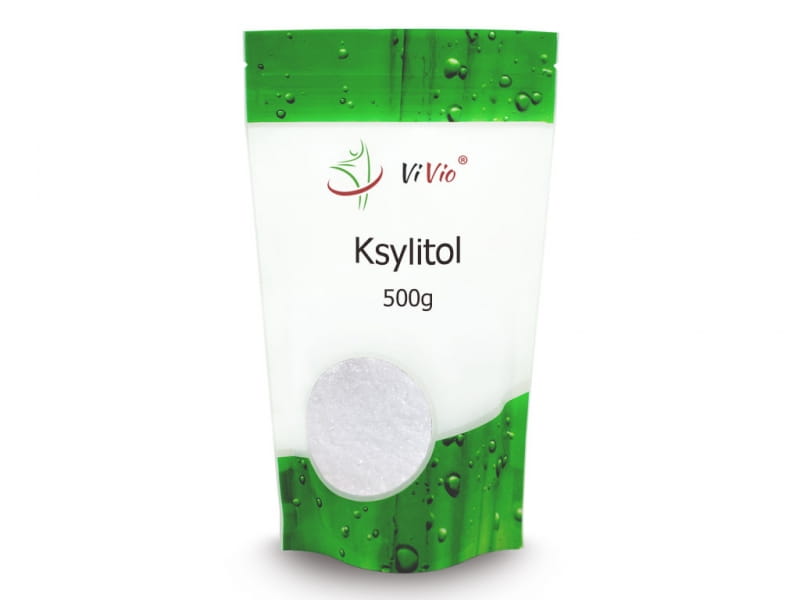Xylitol Finland 500g - VIVIO
- Regular price
- €7,94
- Regular price
-
- Sale price
- €7,94
- Unit price
- per
Couldn't load pickup availability
Description
xXylitol is a natural substance that is increasingly being used as a substitute for white sugar. Like sorbitol and mannitol, it belongs to the group of polyols (low-carbohydrate carbohydrates) . Importantly, birch sugar also has a relatively low glycemic index. This means it doesn't suddenly raise your blood sugar levels. Therefore, it is often found in the diet of people struggling with diabetes, obesity or insulin resistance. Xylitol is similar in appearance to traditional sugar. Its taste is also similar but has a slight mint aftertaste. This product is most commonly found in the form of small, white crystals sealed in a sachet weighing 250, 500 or 1000 grams. Nonetheless, xylitol is also often used to make chewing gum, breath freshener, and even toothpaste.
Xylitol is an ingredient of natural origin. It is mainly found in the bark of Finnish birch, from which it is most commonly obtained. However, this ingredient is also found in some fruits. For example in strawberries, plums, raspberries, blueberries and pears. It is also found in small amounts in corn and mushrooms. Interestingly, xylitol is also produced by the human body, but these are only trace amounts.
INGREDIENTS
Xylitol (Finland).
NET WEIGHT: 500 g
APPLICATION
Xylitol can successfully replace white sugar in the kitchen.
Perfect for sweetening drinks and desserts, as well as all kinds of baking and preparing fruit preserves as it is resistant to high temperatures.
Store dry, in tightly closed packages.
It is recommended to use up to 15g of xylitol per day (about 3 teaspoons).
RETENTION RECOMMENDATION
Store cool and dry.
similar products
- Regular price
- €7,94
- Regular price
-
- Sale price
- €7,94
- Unit price
- per
- Regular price
- €7,94
- Regular price
-
- Sale price
- €7,94
- Unit price
- per
- Regular price
- €7,94
- Regular price
-
- Sale price
- €7,94
- Unit price
- per
- Regular price
- €7,94
- Regular price
-
- Sale price
- €7,94
- Unit price
- per
- Regular price
- €7,94
- Regular price
-
- Sale price
- €7,94
- Unit price
- per
- Regular price
- €7,94
- Regular price
-
- Sale price
- €7,94
- Unit price
- per
- Regular price
- €7,94
- Regular price
-
- Sale price
- €7,94
- Unit price
- per
- Regular price
- €7,94
- Regular price
-
- Sale price
- €7,94
- Unit price
- per
- Regular price
- €7,94
- Regular price
-
- Sale price
- €7,94
- Unit price
- per
- Regular price
- €7,94
- Regular price
-
- Sale price
- €7,94
- Unit price
- per
Recently Viewed Products
- Regular price
- €7,94
- Regular price
-
- Sale price
- €7,94
- Unit price
- per
- Regular price
- €7,94
- Regular price
-
- Sale price
- €7,94
- Unit price
- per
- Regular price
- €7,94
- Regular price
-
- Sale price
- €7,94
- Unit price
- per
- Regular price
- €7,94
- Regular price
-
- Sale price
- €7,94
- Unit price
- per
- Regular price
- €7,94
- Regular price
-
- Sale price
- €7,94
- Unit price
- per
- Regular price
- €7,94
- Regular price
-
- Sale price
- €7,94
- Unit price
- per
- Regular price
- €7,94
- Regular price
-
- Sale price
- €7,94
- Unit price
- per
- Regular price
- €7,94
- Regular price
-
- Sale price
- €7,94
- Unit price
- per
- Regular price
- €7,94
- Regular price
-
- Sale price
- €7,94
- Unit price
- per
- Regular price
- €7,94
- Regular price
-
- Sale price
- €7,94
- Unit price
- per
- Choosing a selection results in a full page refresh.











